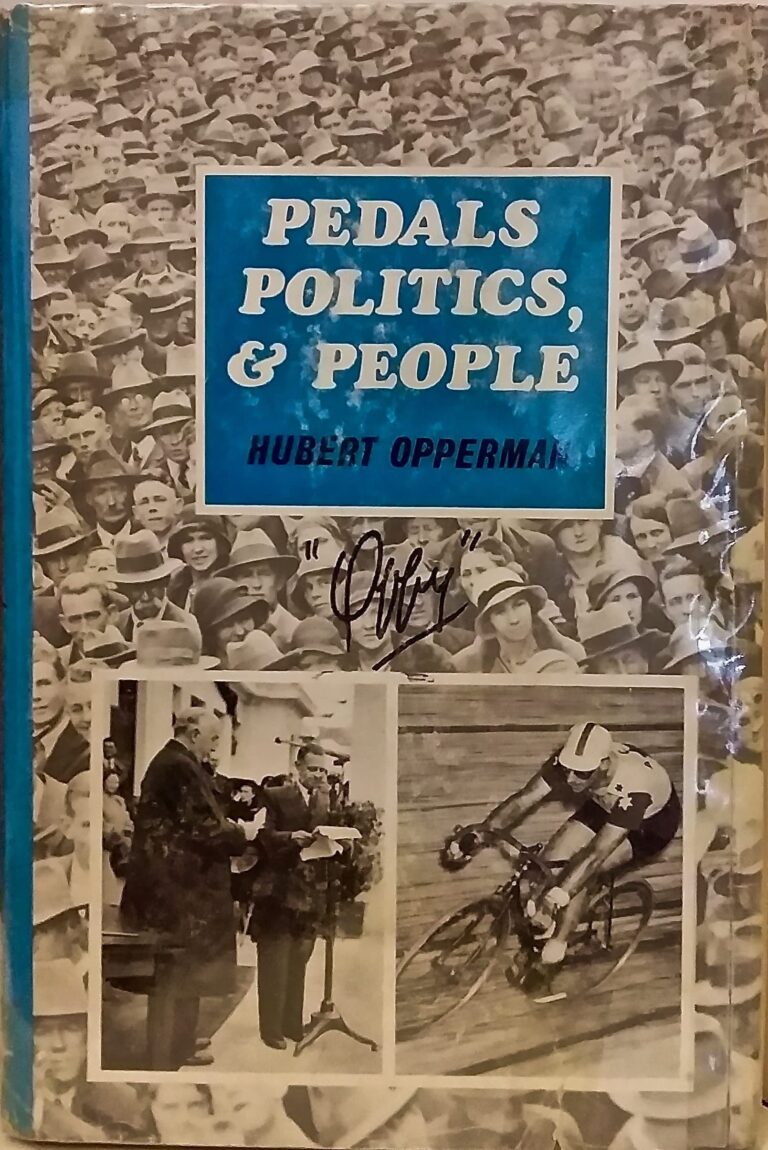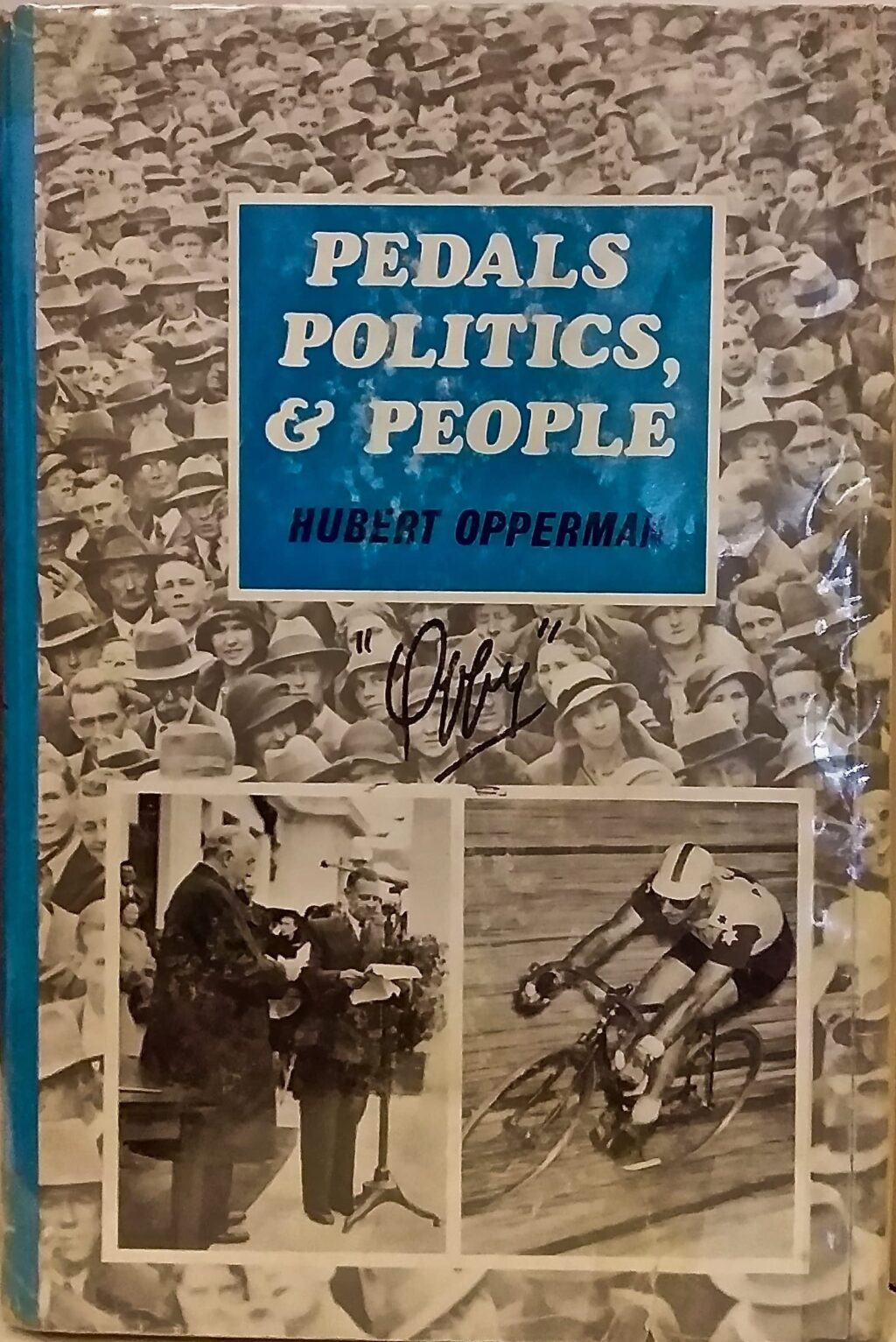H.F. Opperman, Pedals, Politics and People (1977)
Hubert Ferdinand Opperman was known in his day as the ‘Bradman’ of cycling and later became one of the most celebrated of Menzies’s ‘49ers’.
Born in Rochester, Victoria in 1904, Opperman’s father Adolphus enlisted in the AIF when Hubert was still a boy, and he was forced to go live with his grandmother in Melbourne. The silver lining was that not only did Adolphus survive the war, but as a returning gift he gave his son a bicycle.
‘Oppy’ fell in love almost immediately. After showcasing his nascent talents at the Oakleigh West and Malvern cycling clubs, he was recruited by the owner of Malvern Star Cycles to join his racing team and help promote his wares. Oppy soon resigned from his public service job, and committed to becoming a full-time professional athlete.
A teetotaller whose small build allowed him to traverse steep terrain with ease, Oppy’s first major victory was in the prestigious Launceston to Hobart Race in 1922. This ushered in an era of dominance, which would see him win four Australasian National Road Cycling Championships through the decade.
In 1928 Oppy sailed to Europe to captain the Australian team in the Tour de France, and quickly earned the admiration of his hosts. After being hailed as ‘the sublime son of Australia’ and ‘the symbol of all that is best in cycling virtues’, Oppy returned the favour by becoming something of a Francophile and adopting the beret as a signature look. His greatest victory was when he smashed all existing records for the non-stop Paris-Brest-Paris race (1,162 km).
As Oppy neared his thirties, he broke world records to become the fastest man to ride both 100 and 1000 miles. His most iconic endurance effort was when he cycled 4,300km from Fremantle to Sydney, to be met by a crowd of 60,000 fans at the Martin Place finish line.
The outbreak of war forced a pause in Oppy’s cycling exploits at age 35. He enlisted in the RAAF, but would not see direct action – instead serving as drill sergeant and (understandably) a physical trainer. When peace returned he re-entered competitive cycling, but was unable to match his old prowess.
A strong believer in what the individual could achieve, Oppy joined the new Liberal Party and was persuaded to stand for the marginal seat of Corio at the 1949 election. Leaning on his popularity and reputation for hard work, he succeeded in toppling the Minister for Reconstruction John Dedman, the man who had infamously said that Labor had no interest in turning Australian workers into ‘little capitalists’ by helping them own their own homes.
Menzies was initially concerned that the celebrity candidate would not make a smooth transition to the demands of being a local member, but Oppy soon earned the prime minister’s respect. He organised a series of sporting celebrations to commemorate the Jubilee of Federation in 1951, and would subsequently be promoted, first as government whip, then as Minister for Shipping and Transport, and finally Minister for Immigration.
When Holt succeeded Menzies in 1966, the former ushered Oppy into a dignified retirement by appointing him High Commissioner to Malta. Notably, without Oppy the Liberals would lose the seat of Corio at the 1967 election, despite there otherwise being a massive landslide in the Coalition’s favour. To this day as you drive into Geelong from Melbourne you’ll be greeted with the neon image of a cyclist that adorns ‘Oppy’s Bistro’ at the Norlane Hotel.
It was Menzies who encouraged Oppy to write his political memoir, which was given the title Pedals, Politics and People. While by the time of publication Menzies was suffering from a steady decline and refusing most requests to write forewords, he made an exception for his friend. In the book’s opening, Menzies heaps Oppy with praise:
‘Hubert Opperman has many claims to respect and reputation. I will always think of him as the best, and most courageous, local member I ever knew…
In brief, Hubert Opperman was, and is, a man of singular understanding and remarkable courage. During my term as Prime Minister, he was unquestionably one of my greatest assets.’
Oppy’s inscription in the copy of Pedals, Politics and People he gifted Menzies is similarly touching:
‘To The Rt Hon R.G. Menzies KT AK CH FRS QC, “Bob”, Who giving so much for so long to so many, became the inspiration for others to cover their extra miles. With unshakeable respect, admiration and affection. “Oppy”, 19.9.77’
Sign up to our newsletter
Sign up for our monthly newsletter to hear the latest news and receive information about upcoming events.



